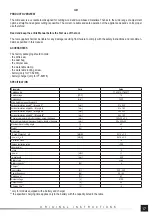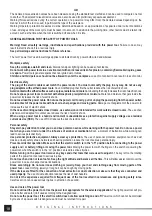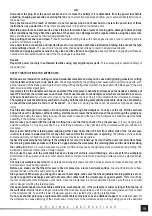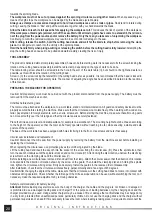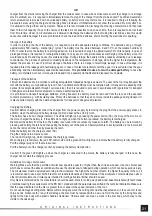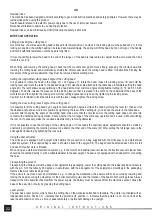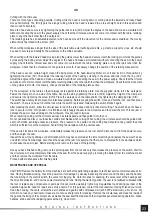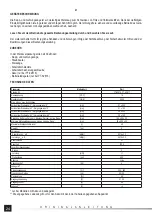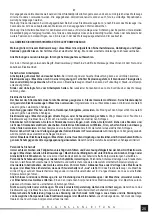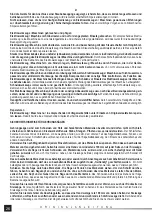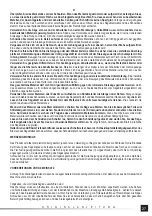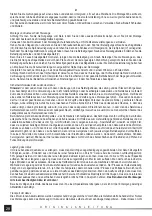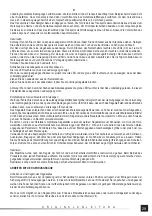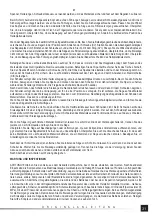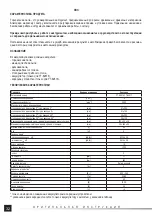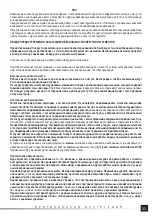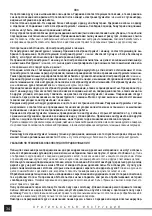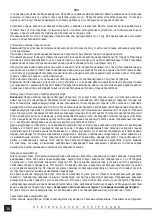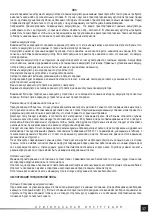
22
GB
O R I G I N A L I N S T R U C T I O N S
Residual risks
The machine has been designed and built according to good construction practices and safety principles. However, there may be
residual risks when using the product.
Health hazard related to the electric power supply due to the use of improper power cords.
Noise hazard related to failure to use hearing protection.
Residual risks can be minimised by strictly following the safety instructions.
MITRE SAW OPERATION
Lifting and locking the cutting head
Out of the box, the mitre saw cutting head is locked in its lower position. To unlock it, the locking pin must be pulled out (VI). In this
locking pin position, the cutting head can be raised and lowered freely. The spring will lift the head, but do not let go of the handle
and hold it with little resistance until the head is fully lifted.
If it is not possible to lower the head to the end of the range or if the head is lowered too far, adjust it with a screw and then lock
it with the nut (VII).
When lifting and lowering the cutting head, check that the movable disc guard moves freely, exposing the circular saw while
lowering the cutting head, and automatically shields the circular saw when the cutting head is lifted. If obstructions blocking the
movement of the guard are detected, they must be removed before starting work.
Setting the longitudinal cutting (bevel) angle of the cutting head
It is possible to rotate the head in the range of +/- 45 degrees. To rotate the head, loosen the locking screw, lift and hold the
locking lever and rotate the table to the desired angle (VIII). Use the scale attached to the table base to facilitate setting the head
angle (IX). The latch allows easy positioning of the head at the most common angles of longitudinal cutting (0; 15; 22.5; 31.6; 45
degrees). To do this, release the pressure on the locking lever so that it is placed in the notch on the underside of the base of the
work table, and then tighten the locking screw. Other cutting angles can only be set by tightening the locking screw.
Caution! It is forbidden to lock the table only with the lever, always tighten the locking screw.
Setting the cross-cutting (bevel) angle of the cutting head.
It is possible to tilt the cutting head by an angle not exceeding 45 degrees. Unlock the head by turning the lever (X), then set it at
the desired angle and secure in this position by tightening the lever. When setting up, you can use the scale on the table base.
Caution! After changing the angle of the cutting head, make sure that the circular saw or the cutting head does not come into
contact with obstacles during operation. Check whether the full range of the mitre saw operation can be used, without switching
the tool on. If necessary, make the required adjustments by removing obstacles.
If it is not possible to use the full range of the cutting angle or if it exceeds the nominal values, adjustment should be made by
unscrewing or tightening the retaining screw at one and/or the other end of the scale (XI). After setting the full range, secure the
bolts against loosening by tightening the lock nuts.
Using the dust extraction
The mitre saw is equipped with a spigot which allows the connection of a bag supplied with the mitre saw or an external dust
extraction system. If the supplied bag is used, it should be fi xed to the spigot (XII). The bag should be emptied each time it is full
and each time after work is fi nished.
When using an external dust extraction system, e.g. in the form of an industrial vacuum cleaner, the fl exible vacuum cleaner hose
should be connected directly or with a suitable adapter to the saw spigot. The saw is not equipped with an adapter for connecting
the hose.
Transporting the product
Transporting the mitre saw must be done in its original factory packaging. Lower the cutting head to the lowest position and secure
with the pin. Turn the table by 45 degrees, in accordance with the arrangement of the polystyrene mouldings in the packaging.
Remove the work table locking screw.
If the saw is to be moved over short distances, e.g. to change the workstation, the saw must fi rst be secured by lowering and
locking the head, securing the movement of the horizontal cutter guide and the rotation of the head in both cutting planes. Always
transport the mitre saw disconnected from the power supply. The battery must be removed from the machine’s socket. Grasp the
base of the saw. Do not carry by grasping the cutting head.
Laser pointer
The saw has a laser pointer, which shows the cutting line on the workpiece attached to the table. The pointer is activated with an
independent switch. Position: O - indicates that the pointer is off , position: I - indicates that the pointer is on. Do not look at the
laser beam emission source, as it may cause temporary or permanent damage to eyesight.
Summary of Contents for YT-82816
Page 33: ...33 RUS residual current device RCD...
Page 34: ...34 RUS 100...
Page 35: ...35 RUS 100 II X...
Page 36: ...36 RUS III IV V 45 Li Ion 10 20 500 0 30 50 70...
Page 37: ...37 RUS XX XX 48 EN 847 1 VI...
Page 38: ...38 RUS VII 45 VIII IX 0 15 22 5 31 6 45 45 X XI XII 45 O I XIII XIV...
Page 39: ...39 RUS XV XVI XVII XVIII XIX 0 3...
Page 41: ...41 UA residual current device RCD...
Page 42: ...42 UA 100 100...
Page 43: ...43 UA II X...
Page 44: ...44 UA III IV V 45 Li Ion 10 20 500 0 30 50 70...
Page 45: ...45 UA XX XX IV V VI VII VIII 45 48 EN 847 1...
Page 46: ...46 UA VI VII 45 VIII IX 0 15 22 5 31 6 45 45 X XI XII 45 O I...
Page 47: ...47 UA XIII XIV XV XVI XVII XVIII XIX 0 3...
Page 129: ...129 GR RCD RCD...
Page 130: ...130 GR 100 mm...
Page 131: ...131 GR 100 mm...
Page 132: ...132 GR X III IV V 45 LED XX XX LED LED LED...
Page 133: ...133 GR LED 48 EN 847 1 VI VII 45 VIII IX 0 15 22 5 31 6 45 45 X...
Page 134: ...134 GR XI XII H 45 O I X II XIV XV XV XVII...
Page 135: ...135 GR XVIII X 0 3 MPa...










